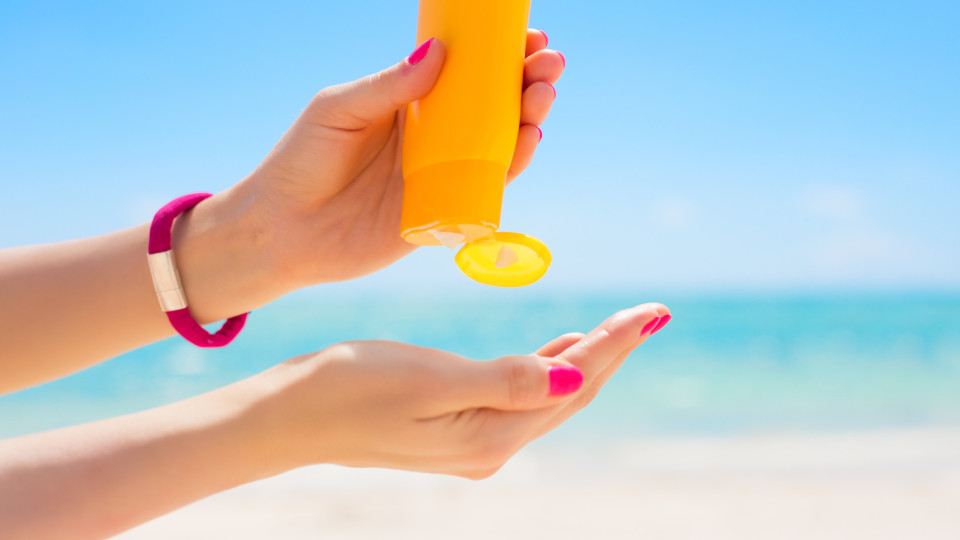Most effective protector in the 'super' or pharmacy? Compare over 40 products
DECO PROTeste has created a comparator where you can find out about dozens of sunscreens, just as summer is approaching. And what about the formula? When choosing, find out if it is preferable in 'spray' or lotion... or if it is all a question of taste.

© Shutterstock

País Protetor Solar
But, after all, is it better to go to the supermarket or pharmacy?
According to the analysis of the experts, the idea that a product with a higher price will protect more is to 'leave at home'. "You can buy sunscreens at the supermarket, even for children. They cost a third of the value of pharmacy and perfumery brands, and are of good and, sometimes, even better quality", details the organization.
But the alert is still given that it is not only necessary to use a good sunscreen, but also to use it in the right amounts. And what is it? The "equivalent to seven teaspoons on the body and a full spoon just for the face", they dose.And how often?
In addition to the right amount to use, it is also necessary to replace the product – ideally every two hours, or when going 'to the bathroom' – even if the chosen one warns that it is waterproof. In terms of prevention, DECO also advises that information can also be a good ally when it comes to preventing problems related to the sun, which, namely, only occur years after prolonged exposure. To this end, the organization advises society to "get used to" seeing the ultraviolet index (UVI) daily, information available on the website of the Portuguese Institute of the Sea and Atmosphere (IPMA) or in any weather application. "This index measures the intensity of the sun's ultraviolet radiation in a location. It varies between zero (at night, when there is no sunlight) and the extreme level of 11, where sun exposure should be avoided at all costs. The higher the UVI, the greater the potential for damage to the skin and eyes, and the less exposure time required for these to occur", they explain, warning: "It is estimated that 80% of skin cancers are caused by intense sun exposure, especially when burns occur".Wherever it is: 'spray' or lotion?
In addition to the tests carried out by DECO, there were also 30 consumers who evaluated each of the more than 40 products and, without seeing the brand, evaluated issues such as odor, texture, ease of application, absorption and appearance on the skin. Regarding efficacy, the organization states that all products are the same, and that consumers have demonstrated their "satisfaction" with the two formulations. "Lotions are thicker and creamier, while sprays are lighter and more transparent on the skin", they distinguish, reinforcing: "Both are effective shields against radiation and appreciated by consumers. And they are suitable for the body and face". In the case of a 'spray', however, you only need to be careful with one aspect: avoid the direction of the eyes, because although it is not dangerous, contact with the eyes can cause eye irritation. And if the protector 'escapes' into the eyes? "In such a situation, rinse your eyes with water and dry thoroughly. Wear sunglasses to protect your eyes", they warn. "The sprays and lotion protectors with SPF 30 tested cost, counting per 200 milliliters (the packages have different capacities), between 5 and 30 euros. The children's versions cost more than 80 euros. That is, there are brands six to eight times more expensive and which are not necessarily better", it reads.And the environment?
Another issue raised by the experts was in relation to the environment, which continues to leave room for improvement. "The best in this criterion did not go beyond the median. One of the main problems is waste. In most cases, it is not possible to use the product until the end. With Corine de Farme Spray Protetor Hidratação+ SPF30, the worst in this criterion, almost a third of the product is retained at the bottom of the package, equivalent to a waste of 4 euros", they explain. Substances with a negative impact on the environment were also detected in the analysis, namely, octocrylene – a type of sunscreen, present in three products with SPF 50+ – or like limonene, an allergenic fragrance.
Descarregue a nossa App gratuita.
Oitavo ano consecutivo Escolha do Consumidor para Imprensa Online e eleito o produto do ano 2024.
* Estudo da e Netsonda, nov. e dez. 2023 produtodoano- pt.com



